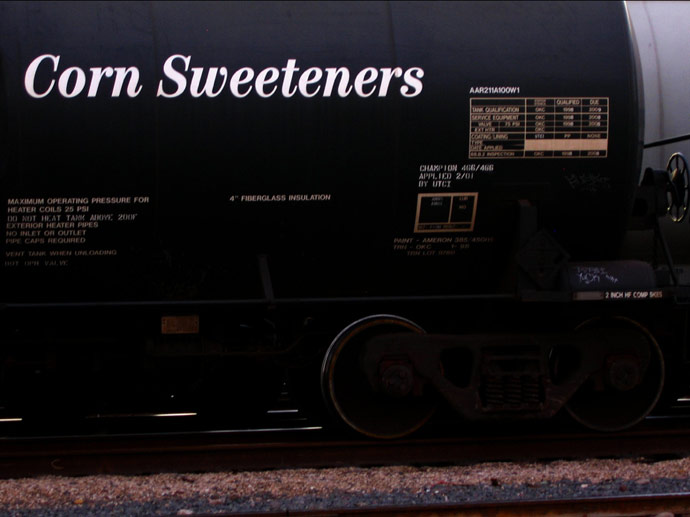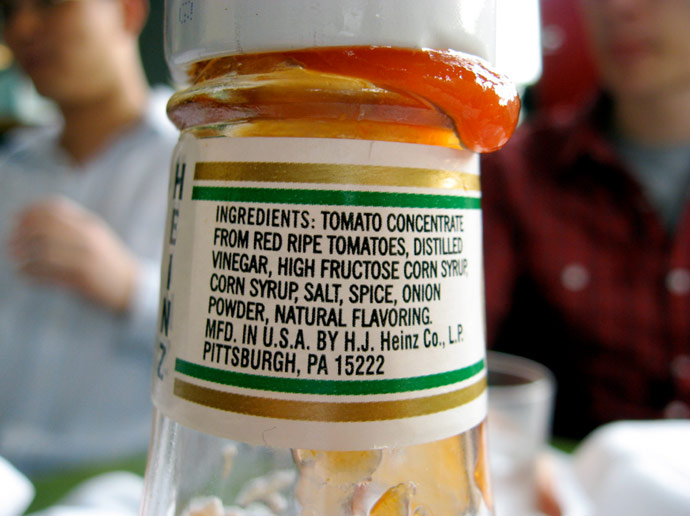High Fructose Corn Syrup: Truth And Consequences

Image via Flickr/ Jonathan Boeke
Much has been written about high-fructose corn syrup. The sweetener first created in 1957 was introduced to US diets in the late 70s and rapidly replaced sugar in soft drinks and many processed foods since—thanks to government subsidies on corn—it is a much less-expensive option. Many have pointed to the parallel of HFCS’s introduction to rising obesity rates in America, which also began to increase in the late 70s. But supporters point to research that shows HFCS is chemically similar to table sugar—both contain the simple sugars fructose and glucose. While the proportion of the two sugars in table sugar is 50-50, HFCS is generally composed of about 55-percent fructose. Both sweeteners contain four calories per gram.
So what’s the truth? Is HFCS worse for people than table sugar, or not? Although the American Medical Association has stated there is nothing unique to HFCS that causes obesity, other research indicates otherwise. A 2010 Princeton University study, for example, concluded that laboratory rats exposed to HFCS were more prone to obesity than those with table sugar in their diets. Long-term consumption of HFCS also led to abnormal increases in rats’ body fat—particularly in the abdomen—as well as increased triglycerides.
Some people have claimed that high-fructose corn syrup is no different than other sweeteners when it comes to weight gain and obesity, but our results make it clear that this just isn’t true, at least under the conditions of our tests,” said Princeton psychology professor Bart Hoebel, who specializes in the neuroscience of appetite, weight and sugar addiction. “When rats are drinking high-fructose corn syrup at levels well below those in soda pop, they’re becoming obese—every single one, across the board. Even when rats are fed a high-fat diet, you don’t see this; they don’t all gain extra weight.”

Image via Flickr/ Jamie McIntyre
Researchers believed it could be the HFCS’s slight variance in composition from sugar that accounts for the different metabolic processing. Because HFCS is not a compound of glucose and fructose, but a mixture of the two sugars, the fructose molecules are unbound and free, ready for immediate absorption. Table sugar, on the other hand, must go through an extra metabolic step to unbind the molecules before it can be utilized by the body.
These rats aren’t just getting fat; they’re demonstrating characteristics of obesity, including substantial increases in abdominal fat and circulating triglycerides,” said Princeton graduate student Miriam Bocarsly. “In humans, these same characteristics are known risk factors for high blood pressure, coronary artery disease, cancer and diabetes.”
Because of its bad press, Americans’ use of HFCS has dropped in recent years. According to Bloomberg, Americans consumed less HFCS in 2011 than during any year since 1997. USDA estimates show the Average American consumed 131 calories of corn sweeteners a day in 2011, a 16-percent drop from 2007 levels. It’s a good thing, too, since research presented at the 2013 Canadian Neuroscience Meeting actually purports that HFCS may be as addictive as cocaine.
University of Guelph associate professor of neuroscience and applied cognitive science Francesco Leri studied rats to examine the behavioral, chemical and neurobiological changes caused by the consumption of HFCS. He found that HFCS causes behavioral reactions in rats similar to those produced by cocaine. Leri says it’s the food addiction that has caused the global obesity epidemic.
We are not rats, but our children do not think too much about the impact of sweets on their brain and behaviour. There is now convincing neurobiological and behavioural evidence indicating that addiction to food is possible. Our primary objective is to discover biological predictors of vulnerability to develop excessive consumption of high fructose corn syrup,” Leri said.
Of course not everyone agrees. Corn Refiners Association president and CEO John Bode said Leri’s and others’ research on HFCS is weak since it is conducted on rats instead of humans.
It is irresponsible and ultimately counter-productive for these researchers to associate safe and widely used foods, such as high fructose corn syrup, with illegal narcotics such as cocaine,” Bode said in a statement. “There remains no credible scientific evidence to suggest that caloric sweeteners, such as sugar and high fructose corn syrup (HFCS), are addictive to humans in general.”
Of course look who’s signing his paycheck. Who is more trustworthy? A scientist that has nothing to gain or lose by the outcome of his experiments or a suit that has probably gotten rich off of promoting the substance? You can make up your own mind.









































